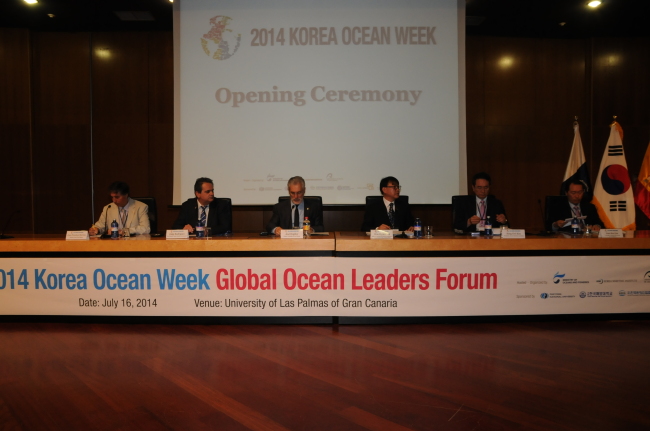South Korea ups pitch against illegal fishing in deep oceans
By Korea HeraldPublished : July 18, 2014 - 20:48
LAS PALMAS, Spain ― South Korea reiterated its pledge to up the fight against illegal fishing in the deep oceans in a bid to reverse the EU’s latest decision to include Seoul on a preliminary list of countries held accountable for illegal, unreported and unregulated fishing activities.
“South Korea will act as a more responsible state by establishing comprehensive and transparent plans reflecting the needs of the industrial circles, nongovernmental organizations, and related countries,” said Choi Wan-hyun, director general of the Ministry of Oceans Fisheries, at the Global Oceans Leaders Forum held at University of Las Palmas of Gran Canaria on Wednesday.
The forum, which was part of the Korea Ocean Week event marking Korea’s ties with Europe and Africa, was attended by South Korean representatives and members of academia, the Las Palmas authorities and delegations from African states including Morocco, Senegal and Equatorial Guinea.
In November, the EU issued a preliminary identification to South Korea, which experts refer to as the industry’s yellow card. Under the move, Seoul’s fishery exports to EU states may be blocked, causing it to lose more than $100 million (102 billion won) every year.
South Korea has yet to be included on a finalized list. An EU delegation visited here for a final review in June.
“South Korea will act as a more responsible state by establishing comprehensive and transparent plans reflecting the needs of the industrial circles, nongovernmental organizations, and related countries,” said Choi Wan-hyun, director general of the Ministry of Oceans Fisheries, at the Global Oceans Leaders Forum held at University of Las Palmas of Gran Canaria on Wednesday.
The forum, which was part of the Korea Ocean Week event marking Korea’s ties with Europe and Africa, was attended by South Korean representatives and members of academia, the Las Palmas authorities and delegations from African states including Morocco, Senegal and Equatorial Guinea.
In November, the EU issued a preliminary identification to South Korea, which experts refer to as the industry’s yellow card. Under the move, Seoul’s fishery exports to EU states may be blocked, causing it to lose more than $100 million (102 billion won) every year.
South Korea has yet to be included on a finalized list. An EU delegation visited here for a final review in June.

Choi cited Seoul’s efforts to become more responsible, pointing out that it has imposed sanctions on more than a score of its own ships believed to have conducted illegal fishing activities in the West African waters. He also vowed to further reinforce monitoring over illegal fishing.
“Let me quote an African saying: ‘When you want to go fast, walk alone but if you want the walk to last, go together.’ What this means is that South Korea will work with the global community to fight illegal fishing,” the director general told The Korea Herald on the sidelines of the forum
Choi is currently in private bilateral talks with African states to discuss how to step up fishing cooperation.
The EU has been beefing up fishing regulations to help root out unauthorized fishing activities. It has been suggested that the sanctions would be used as leverage to urge other countries, such as the U.S., to participate in the EU initiative.
“I admit that we may have appeared lukewarm in encouraging global standards (in fishing) but we have changed. One example is that we already have our Distant Water Fisheries Development Act to promote legal fishing activities,” Choi said.
Seoul’s latest efforts were met with generally favorable reviews, but more is being suggested.
Max Schmid, the project coordinator and campaigner at the Environmental Justice Foundation, which reported the illegal fishing activities of South Korean vessels to the EU, said he is optimistic that the recent dialogue could help improve transparency. But he remained cautious about such prospects.
Schmid said that the Korean government needs to be clear about its willingness to create a global monitoring system and regulations against activities involving fishing vessels swapping national flags to dodge the fishing quota.
“What is important is what is happening in the field. This is not a three-month project. We will have to see the changes in the field out there,” he said.
By Bae Ji-sook, Korea Herald correspondent
(baejisook@heraldcorp.com)
-
Articles by Korea Herald









![[Hello India] Hyundai Motor vows to boost 'clean mobility' in India](http://res.heraldm.com/phpwas/restmb_idxmake.php?idx=644&simg=/content/image/2024/04/25/20240425050672_0.jpg&u=)










